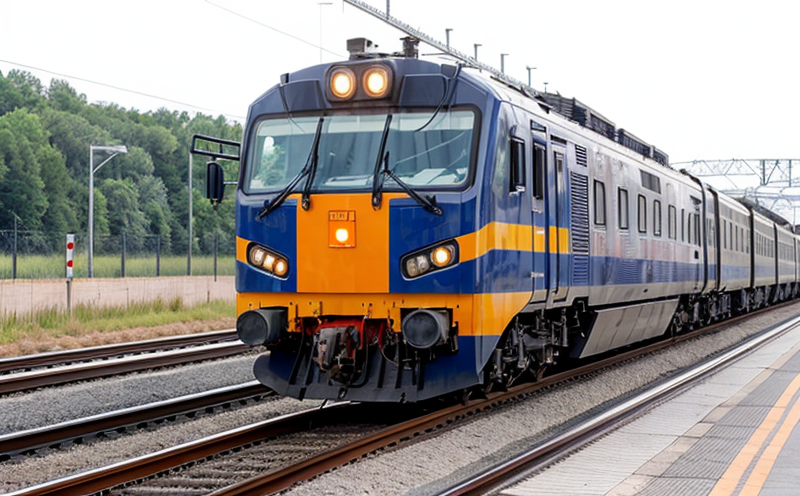Testing for Fatigue Resistance in Railways’ Power Systems
Testing for Fatigue Resistance in Railways Power Systems Ensuring the Reliability and Safety of Your Railway Infrastructure
As the backbone of modern transportation systems, railways play a vital role in connecting cities, countries, and continents around the world. The reliability and safety of railway infrastructure are crucial to ensuring the smooth operation of trains, protecting passengers and crew members, and preventing costly downtime. One critical aspect of maintaining reliable and safe railway infrastructure is testing for fatigue resistance in power systems.
Fatigue resistance testing is a laboratory service provided by Eurolab that simulates real-world operating conditions to assess the integrity and lifespan of railway power systems. By identifying potential weaknesses and vulnerabilities, rail operators can take proactive measures to prevent equipment failure, reduce maintenance costs, and ensure compliance with regulatory requirements. In this article, we will delve into the importance of testing for fatigue resistance in railways power systems, highlighting its benefits, advantages, and applications.
Why is Testing for Fatigue Resistance in Railways Power Systems Essential?
Railway power systems are subject to various stresses, including voltage fluctuations, temperature changes, and load variations. Prolonged exposure to these stressors can lead to equipment failure, reduced lifespan, and decreased performance. Testing for fatigue resistance in railways power systems helps identify potential issues before they become major problems.
Some of the key reasons why testing for fatigue resistance is essential include
Ensuring Safety Fatigue-resistant railway power systems reduce the risk of equipment failure, which can compromise passenger safety.
Reducing Downtime Regular maintenance and inspection schedules can be minimized, reducing costly downtime and increasing operational efficiency.
Compliance with Regulations Testing for fatigue resistance ensures compliance with regulatory requirements, such as those set by the International Union of Railways (UIC) and the Association of American Railroads (AAR).
Increased Lifespan Identifying potential weaknesses allows rail operators to take proactive measures to extend the lifespan of equipment.
Cost Savings Preventing equipment failure reduces maintenance costs, minimizing the financial burden on rail operators.
Advantages of Using Testing for Fatigue Resistance in Railways Power Systems
Testing for fatigue resistance in railways power systems offers numerous advantages, including
Improved Equipment Reliability Identifying potential weaknesses and vulnerabilities ensures that equipment operates as intended.
Reduced Maintenance Costs Preventing equipment failure reduces maintenance costs and extends the lifespan of equipment.
Enhanced Safety Fatigue-resistant railway power systems minimize the risk of equipment failure, ensuring passenger safety.
Increased Efficiency Regular testing enables rail operators to optimize maintenance schedules, reducing downtime and increasing operational efficiency.
Compliance with Regulations Testing for fatigue resistance ensures compliance with regulatory requirements.
Benefits of Eurolabs Laboratory Services
Eurolabs laboratory services provide a comprehensive range of benefits, including
Accurate Results Our state-of-the-art equipment and experienced technicians ensure accurate results that meet or exceed industry standards.
Timely Delivery We understand the importance of timely delivery and strive to provide rapid turnaround times without compromising on quality.
Expertise Our team of experts has extensive knowledge and experience in testing for fatigue resistance in railways power systems.
QA Frequently Asked Questions about Testing for Fatigue Resistance
Q What is testing for fatigue resistance in railways power systems?
A Testing for fatigue resistance involves simulating real-world operating conditions to assess the integrity and lifespan of railway power systems.
Q Why is testing for fatigue resistance essential for railway infrastructure?
A Testing for fatigue resistance ensures safety, reduces downtime, complies with regulations, increases lifespan, and saves costs.
Q How does Eurolabs laboratory service differ from others in the industry?
A Our state-of-the-art equipment, experienced technicians, and comprehensive testing protocols ensure accurate results that meet or exceed industry standards.
Q What types of equipment can be tested for fatigue resistance using Eurolabs services?
A We test a wide range of railway power system equipment, including transformers, motors, generators, and more.
Q How long does it take to receive test results from Eurolab?
A Our rapid turnaround times ensure that you receive your test results quickly without compromising on quality.
Conclusion
Testing for fatigue resistance in railways power systems is a critical aspect of maintaining reliable and safe railway infrastructure. By identifying potential weaknesses and vulnerabilities, rail operators can take proactive measures to prevent equipment failure, reduce maintenance costs, and ensure compliance with regulatory requirements. Eurolabs laboratory services provide accurate results, timely delivery, and expert expertise in testing for fatigue resistance in railways power systems.
Dont wait until its too late contact us today to learn more about our comprehensive range of laboratory services and how they can help you maintain safe and reliable railway infrastructure.
Additional Resources
For more information on Eurolabs laboratory services, please visit our website.




